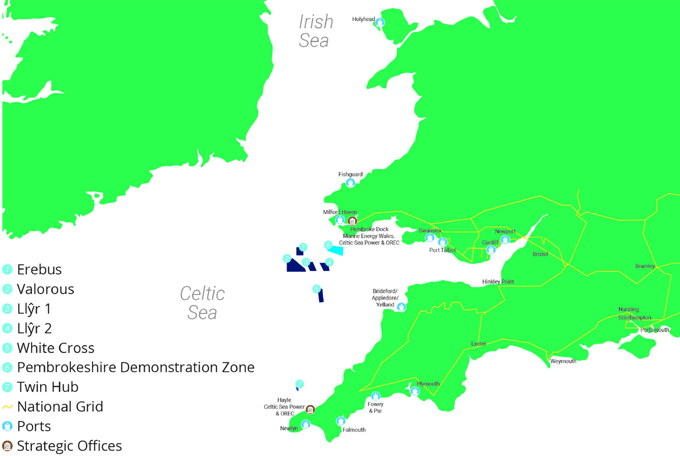The Celtic Sea Cluster’s vision is to make the Celtic Sea the best place in the world to develop offshore wind. The Cluster was set up to accelerate floating wind development by establishing the market, accelerating supply chain readiness and creating sustainable jobs.
RPS are ideally placed to support the Cluster’s ambitions. Based in Wales and the south west, the company bring a unique mixture of local consenting knowledge through projects such as the Pembroke Dock Infrastructure and the Marine Energy Testing Area (META) projects – two of the four pillars of the Pembroke Dock Marine collaborative project, to support the development of the marine energy industry in Wales. This local experience combines 20 years’ experience at the forefront of the offshore wind industry both globally and across the UK; RPS are currently delivering the EIA and HRA for the Mona (and Morgan) offshore wind farm projects for the bp and EnBW consortium in the Irish Sea.
Commenting on their membership, Nicola Simpson, Technical Director of RPS’ Marine Consenting and Environment team said:
“We're thrilled to have our membership confirmed and continue to play an active role in the development of floating offshore wind in the Celtic Sea. Our membership recognises our clear interest in the sector and our commitment to supporting these exciting projects as they move forward. It also provides us with a platform to share the unique knowledge we have gained from our work both within Wales and the South-West and through our position as global offshore wind experts.”
The development of floating offshore wind in the Celtic Sea is edging closer to reality; last month the Crown Estate announced 5 defined areas of development, to deliver around 4GW of capacity. If you would like to discuss how RPS might support your project, please get in touch with our team at any time.
The vision of the Celtic Sea Cluster is to make the Celtic Sea the best place in the world to develop offshore wind, particularly floating offshore wind, and to ensure the geographical area can maximise the economic potential of those technologies. The intention is to work closely with neighbouring regions such as North Wales and Ireland to enhance the broader offshore wind agenda and ensure complementarity.

The Cluster will respond to the growing number of project developers staking a claim to areas of seabed in the Celtic Sea, the area of ocean situated off the coast of Cornwall, between Wales and Ireland.
It will support floating wind developers access between 15 and 50GW of the 150-250 GW total floating offshore wind capacity that could realistically be developed in the Celtic Sea, the region of sea space between the England, Wales and Ireland.
Floating offshore wind is expected to contribute to the creation of more than 29,000 UK jobs and deliver an anticipated £43.6bn in UK gross value add (GVA) by 2050 against a 100GW offshore wind deployment scenario, whilst boosting industry and opportunity in Wales and the South West.
With the UK setting a target of 40GW of offshore wind by 2030, the ambition is at least 1GW will come from floating wind.
And with the Climate Change Committee predicting we’ll need at least 100GW of offshore wind by 2050 to meet our Net Zero targets, a significant proportion of which will be floating wind, the scale of the task is enormous, requiring a coordinated response from the UK supply chain and a potential economic boom for Wales and the South West from the engineering, operations, and maintenance of the Celtic Sea floating wind platforms and turbines.
KeyFacts Energy Industry Directory: RPS Energy l ORE Catapult
 KEYFACT Energy
KEYFACT Energy